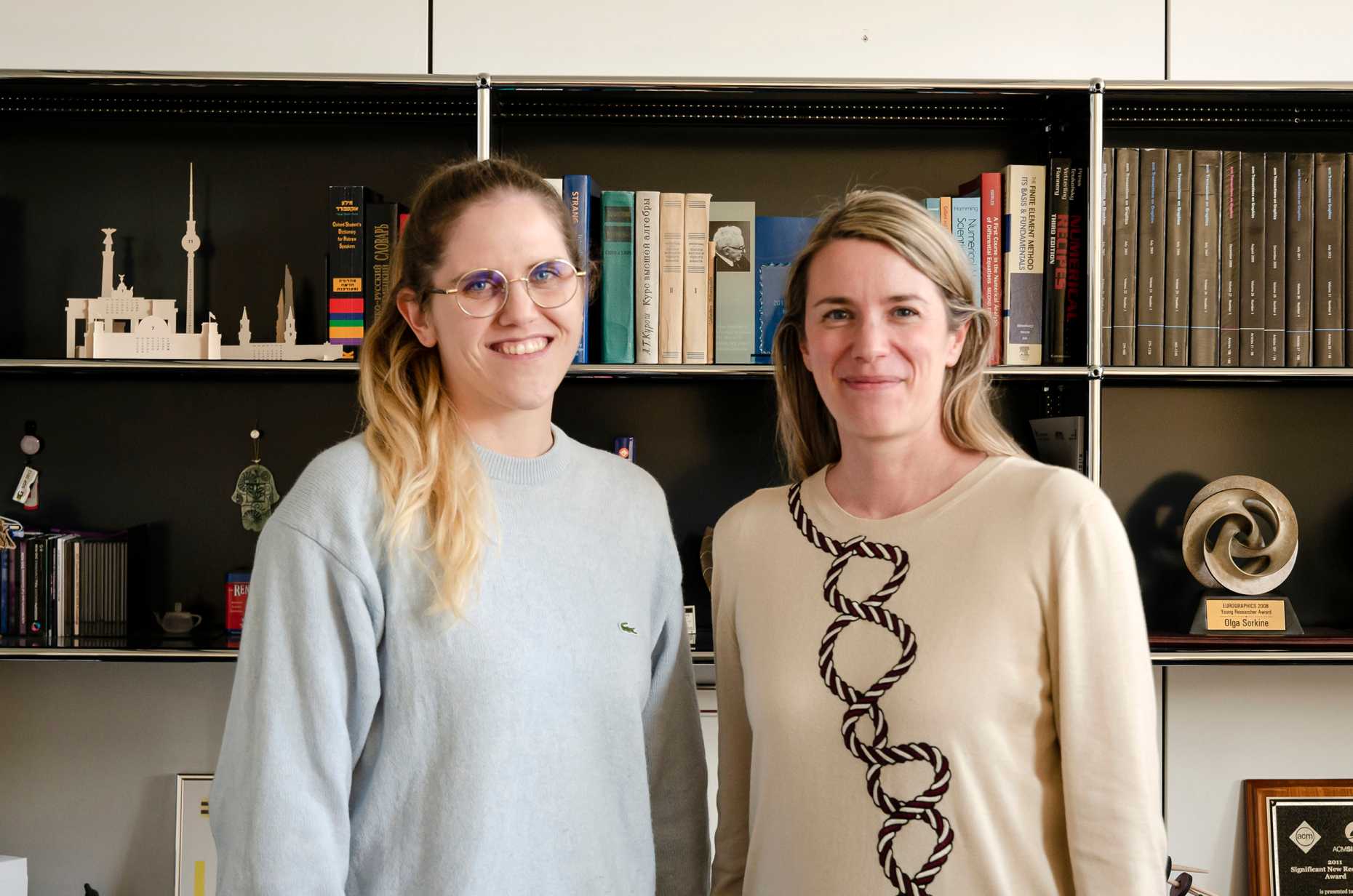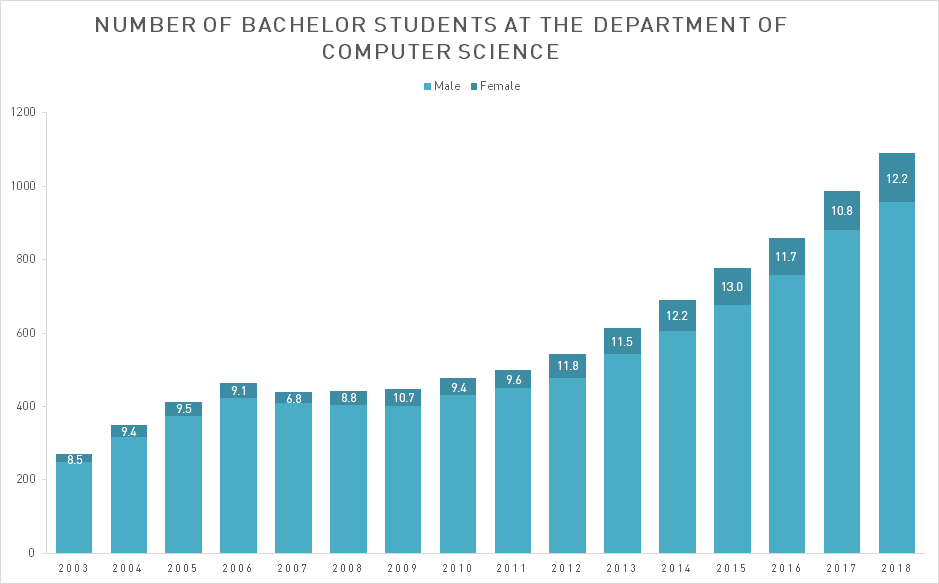“Women are just as good as men at computer science”
24.01.2020 | Anna Ettlin
The CSNOW (Network of Women in Computer Science) supports and connects women the Department of Computer Science. At the turn of the year, the organisation’s leadership changed. Lara Schmid, a doctoral student in the Information Security Group, co-directed CSNOW for two years, initially alongside Yeara Kozlov, later with Mridula Singh and Alexandra Ion, who are now taking over from her. Olga Sorkine-Hornung, the professor responsible for CSNOW for the past nine years, is also handing over the reins. In an interview, both women look back on their time at CSNOW and explain why the Department of Computer Science should continue to support women.

When and why did you decide to become involved with CSNOW?
OS: When I came to ETH nine years ago, Professor Friedemann Mattern asked me to take over responsibility for the network. He was my predecessor in this role. At that time, CSNOW was called “Frauenförderung”.
LS: I was also approached by my predecessors two years ago. I had previously given a lecture to the participants of the taster week and knew the leaders. The longer I am involved, the more I believe that it is vital to support women in the department.
Why is it important for the Department of Computer Science to encourage women?
LS: We have to fight against the prejudice that women do not belong here. There are still very few women in the department. I personally have never been too bothered by this, but during my time at CSNOW, I have met many female students who have been affected by it.
OS: I must admit that when I came to ETH, I believed this problem was already solved. I came from Israel and the USA. Both countries are somewhat more advanced in this respect. Besides, I was much younger and a bit naive. During my Bachelor’s degree in Israel, there were several female professors who taught at my university. A few years ago, I was speaking to a student here, and she only realised in the middle of the conversation that I was a professor. She said she was in the sixth semester of her programme and had never encountered a female lecturer. That’s when it became clear to me that many of our female students still have very different experiences from my own. CSNOW helps women in the department to network and to become more visible, so that female Bachelor’s students can see that there are also female Master’s students, doctoral students and professors in computer science.
What has CSNOW achieved so far?
OS: The proportion of women in the computer science Bachelor’s programme has increased somewhat, although not as much as we would like: from nine percent in 2010 to 12 percent in 2018. But we only have a limited influence on this. The most important part of our work is the well-being and networking of women here in the department. We offer many more events and activities today than we did nine years ago. I also feel that the department has become more open to topics like gender equality and diversity. The younger generation is much more aware of these issues, and men are also becoming more involved.
LS: We would be happy if even more men were to participate in CSNOW. It is important to us that we always have men on the team, because we don’t want to be a women-only organisation.
OS: Another positive development, even if it is not solely attributable to CSNOW: when I came to ETH in 2011, there were only three female professors in the department. By the end of 2020, there will be seven of us. The department has never had so many female professors before!
"A few years ago, I spoke to a student here who was in the sixth semester of her programme and had never encountered a female lecturer."Professor Olga Sorkine-Hornung
Did you ever feel like you were fighting a losing battle?
LS: It was a little frustrating at times that despite all our efforts, the percentage of women hardly increased at all. But that is not something that changes suddenly from one year to the next. The mood in our team and among the female students was always positive, so the frustration was soon forgotten.
OS: We always had a great team that worked passionately towards our goals. In the beginning, some colleagues in the department believed that the empowerment of women was sufficiently addressed with CSNOW and that there was no need to take further action. Fortunately, this view has changed over the years.
CSNOW wants young women to see female computer scientists as role models. Did you have such role models yourselves?
OS: In addition to female lecturers at university, I have my mother, who studied mathematics and worked as a software engineer. I didn’t see her as a role model, though; it was just normal for me. My family is originally from Eastern Europe, where the culture is different: almost all women work. Switzerland was therefore a culture shock for me.
LS: I hardly had any female professors, but professionally, I was also inspired by male role models. However, my mother also always had a job – although it had nothing to do with mathematics or computer science – so that was the norm for me, too. Moreover, my family has always encouraged me to do what I want and not to think in stereotypes.
Are there particular stereotypes about women in computer science that you never want to hear again?
OS: There are so many! For example, that women only go into computer science if the work is for the benefit of people and society. On the one hand, I believe that working for the social good is motivating for men too, but on the other hand, I know many women – including myself – who also enjoy working on completely abstract problems. I find this preconception very annoying, because it implies that there shouldn’t be equal numbers of women and men in computer science. If you believe this stereotype, there are no longer any societal or legal obstacles and the root cause lies with the women themselves, because their brains supposedly work differently from men’s. However, current research shows that this is not true.
LS: Yes, I don’t like to hear that either. Many people believe that women are just not interested in computer science. This argument is too simplistic. People forget that upbringing and society have a major influence on the way we form our opinions.
"I understand that men sometimes feel uncertain and don’t know how to act towards women. But there is a relatively simple solution to this: just ask."Lara Schmid
Have you experienced any prejudices yourselves?
LS: People often act very surprised when I tell them that I am studying computer science: “What, really? You? Computer science?” That irritates me a little. It’s not really that serious, but it can still be discouraging if you feel like you constantly need to justify your choices.
OS: Later on, there is also the fact that many people believe in positive discrimination towards women. They think that your publications are only quoted because, as a woman, you are more visible, and that you only got this job or that award because of your gender. This attitude is the very opposite of positive discrimination because it has a very negative impact on self-confidence and self-image.
What can we all do to combat these stereotypes?
OS: Each and every one of us can question our own preconceptions. For example, if you name a profession, you can use the feminine form for a change. Doctors, architects and professors aren’t always male. And don’t assume that girls only ever want pink dolls.
LS: I think we are all guilty of stereotypical thinking. You might ask yourself, what role do these prejudices play in my everyday life? Where do I act differently depending on who I am dealing with? Becoming aware of this is a big step in the right direction. I understand that men sometimes feel uncertain and don’t know how to act towards women. But there is a relatively simple solution to this: just ask, for example during a discussion event on this topic.
What advice would you give to a young woman just starting her computer science studies?
LS: Don’t let yourself be intimidated. In the first year, it feels like everybody else knows everything better than you. But only the first-year exams will show who really knows anything. And networking pays off, be it via CSNOW or through study groups.
OS: Despite the unequal numbers of men and women, it is a great profession, one of the most promising at the moment. You can find excellent jobs that are usually very compatible with having a family. Women are just as good as men at computer science. Their average grades during their degree programmes prove this. Only at the beginning is there a small gender gap, which can be explained by the fact that women have less programming experience on average. In the later semesters, even this difference disappears. So: keep your chin up, and good luck!
About CSNOW
The Network of Women in Computer Science (CSNOW) supports and connects female students and researchers in the Department of Computer Science and organises events that increase the visibility of women in computer science. The organisation, initially known as “Frauenförderung”, was founded in 1993 as a student-led initiative. At that time, the proportion of women in the Department of Computer Science was just 0.7 percent. In 2018, the percentage was 12.2.
The activities of CSNOW include a mentoring programme for new female students, various workshops and events and, since 1999, a one-week taster course in which female high school students are given the chance to find out more about computer science and get to know female computer scientists. In 2001, the taster course was awarded the “Knights of Communication” prize by the Swiss government. Today, the taster course is offered twice a year.
The CSNOW team consists of five to six members from all levels, from Bachelor’s students to postdocs. A responsible professor represents the network towards the department and ETH Zurich. CSNOW is led by two doctoral students or postdocs, who are released from additional teaching duties in exchange. At present, CSNOW is headed by Mridula Singh and Alexandra Ion, with Julia Vogt as the responsible professor since January 2020.
